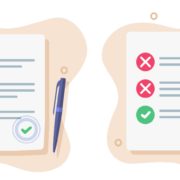MPRE Advice: What I Wish I Knew Before The Exam
MPRE Advice: What I Wish I Knew Before The Exam
The Multistate Professional Responsibility Exam, otherwise known as the MPRE, is another test law students must pass prior to being licensed to practice in most jurisdictions. This is an exam that tests students’ abilities to recognize situations in which an attorney’s ethics could be called into question. Students must answer 60 multiple-choice questions over two hours of testing. The passing rate varies from state to state, so be sure to check your state’s requirements. Because this is such a critical component to being able to practice, here are four pieces of MPRE advice I wish I knew before I sat for the exam.
MPRE Advice: What I Wish I Knew Before The Exam
1. Use this exam to figure out what works well for bar study.
The MPRE can and should be used by law students to determine what study practices would be best for the bar. Take inventory of how you digest information the best. Spend a few minutes taking our Learning Style Quiz to figure out how you learn best!
2. You can get study materials for this test from more than one source for FREE.
Unlike the bar, students do not have to pay for MPRE study materials. Most bar prep companies offer free MPRE materials in order to entice students to purchase their bar materials. Take advantage of this and sign up for multiple practice tests through various bar prep companies. Find out what style of preparation works for you and what does not. Think of it as a practice run for studying for the bar.
This is also a great way to make your final decision on which bar prep company you want to use after you graduate. After doing research with all the companies in studying for the MPRE, you’ll have a sense of which you gel best with and should take for the bar exam. Check out an example of free MPRE materials here.
3. Do not try to cram for the MPRE
I repeat, do not cram for this test! Many law students underestimate the difficulty of the MPRE. While these questions cover a single subject – ethics, it can be a subjective and tricky topic. You may see an answer you think is correct but it preys on your sense of morality and not necessarily what the MPRC upholds. (Your personal morals and the ethics governing the legal practice may not always be the same thing!)
Remember, this is not a test asking what decisions you think are ethical. This is a test to ensure you understand ethics according to the Model Rules of Professional Conduct. You need to spend time learning the various types of questions asked, the common tricks used to distract students, and the pace needed to complete the test on time. As mentioned above, think of this as a practice for the bar, you do not need to spend months preparing. However, committing about three weeks at a normal study pace will set you up for success.
4. Take your law school ethics course before the MPRE
When you start studying for the bar, you will notice that the courses you took in law school come much easier than learning a new course from scratch. The same is true for the MPRE.
Students often take their required legal ethics course in their second year of school. Often times, schools gear this class towards helping you pass the MPRE. Therefore, it would be illogical to try and take the MPRE before taking your ethics class. The MPRE is offered three times per year. The best course of action is to schedule your ethics course so that you can take the MPRE after completing this course. If that schedule does not work and you have to wait a long time between the completion of your ethics class and the next MPRE administration, then you will still be easily able to refresh your knowledge prior to the exam.
Seeking Success in Law School?
- Benefit from personalized one-on-one tutoring by our seasoned law school tutors.
- Explore our NEW and highly acclaimed law school study aids, available for a free trial.








Leave a Reply
Want to join the discussion?Feel free to contribute!